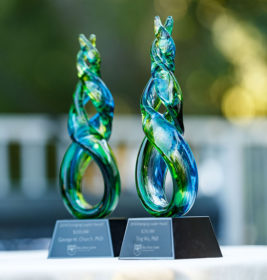
The Bay Area Lyme Foundation Emerging Leader Awards (ELA) recognize both established and up-and-coming researchers bringing new approaches and creative thinking to the field of Lyme disease.
These grants support new and innovative projects and aim to attract aspiring new scientific talent to the field of Lyme. Candidate applications must include a viable proposal for a proof-of-concept project to be funded, in part or in sum, by the grant award.
Applications for the 2024 Emerging Leader Award will begin to be solicited in October 2023. Applicants must submit an application, research proposal, and at least one supporting letter from their supervising manager or Principal Investigator.
For more information or questions about the application process, please contact the foundation offices at info@bayarealyme.org or tel. 650.530.2439.
About 2024 ELA
The Bay Area Lyme Foundation Emerging Leader Awards (ELA) recognize both established and up-and-coming researchers bringing new approaches and creative thinking to the field of Lyme disease. These grants support new and innovative projects and aim to attract aspiring new scientific talent to the field of Lyme. Candidate applications must include a viable proposal for a proof-of-concept project to be funded, in part or in sum, by the grant award.
$150,000 ELA Grant
For 2024, we plan to offer at least one $150,000 ELA grant to researchers in academia or the private sector who are currently at the post-doctoral level through associate professor level or equivalent. Those who have not previously worked in Lyme disease research are also encouraged to apply. While we are particularly interested in applicants who have identified a defined approach to improving diagnostics or therapeutics for Lyme disease, this award is open to all areas of research needed for Lyme disease patients.
Important criteria include demonstrated professional and scientific leadership in the biomedical sciences and a strong supporting scientific rationale for the project. Research efforts funded by this award are required to generate initial proof of concept within 12–24 months. Use of samples from the Lyme Disease Biobank is encouraged but not required.
Selection Process
Applications for the 2024 are being solicited beginning October 2023. Applicants must submit an application, research proposal, and at least one supporting letter from their supervising manager or Principal Investigator.
Candidates should complete the following application and send it to award@bayarealyme.org. We will be accepting applications through March 1, 2024.
Applications should include a research proposal of no more than 10 pages (at least 10 point font, any line spacing accepted) using the outline below. Page count excludes pages required for references and biosketch/CV. Applications are reviewed by the Bay Area Lyme Foundation’s Science Committee and adjunct advisors. Winners will be announced in June, 2024, and will be invited to attend our annual LymeAid® event in September.
It is the policy of the Bay Area Lyme Foundation to pay no more than 5% of any grant toward overhead or indirect costs, and travel costs are excluded.
For more information or questions about the application process, please contact the foundation offices at info@bayarealyme.org or tel. 650.530.2439.
Who Qualifies?
- Affiliated with an academic or research institution in the U.S. or corporate equivalent
- Demonstrated professional and scientific leadership in biological and medical sciences
- Exhibited scientific curiosity and an established pattern of creative thinking
- A defined approach to improved diagnostics or therapies for Lyme disease
Evaluation Criteria
- Potential for research to lead to a novel therapy or diagnostic for Lyme disease
- Scientific rationale supporting the application (perhaps validated in another field)
- Applicant’s track record for project execution
- Support from Principal Investigator and affiliated institution
- Co-investigators will be considered on a case by case basis but may not receive more than 33% of the total grant amount
- Timeline: Application shows sufficient potential to generate initial proof of concept within 12–24 months
Previous Honorees
2023 ELA Winner
We were pleased to announce the recipient of the 2203 Emerging Leader Awards, which was designed to support promising scientists who represent the future of Lyme disease-research leadership. This year the Emerging Leader Award was made possible through the generosity of the Younger Family Foundation.
$150,000 Grant
 Andriy Batchinsky, MD
Andriy Batchinsky, MD
Senior Scientist, Geneva Foundation
Dr. Batchinsky is a general surgeon by training and a translational scientist by passion. He received his MD degree from Uzhgorod State University and general surgery residency training at the State University in Lviv, Ukraine. After practicing as an emergency trauma surgeon in Ukraine, Dr. Batchinsky joined the U.S. Army Institute of Surgical Research as a National Research Council Fellow in 2001 and, subsequently in 2004, as a research scientist. He currently serves as a Senior Scientist at the Geneva Foundation.
Dr. Batchinsky has a special interest in minimally invasive wearable and expeditionary extracorporeal life-support (ECLS) for treatment of lung and multiorgan failure; resuscitation of patients with massive severe combined injuries and exsanguination using modern ECLS and developing biologically friendly heparin-free ECLS. With his recent ELA award, Dr. Batchinsky will be applying this expertise towards treatment of Lyme disease.
Dr. Batchinsky is a reviewer for a number of medical journals, is a member of multiple societies, past president of the International Society for Complexity in Acute Illness, and founder and director of the Department of Translational Medicine at the University of the Incarnate Word School of Osteopathic Medicine at Brooks City Base in San Antonio, Texas.
Dr. Batchinsky has personal motivation as his daughter is currently struggling with Lyme and co-infections. He is extremely committed to this effort and plans to leverage his research facility and medical expertise toward finding an effective treatment. He has already reached out and visited the top Lyme researchers such as Dr. Monica Embers to start collaborative efforts. There is no question that he is the epitome of what an Emerging Leader truly is, and we are excited for this impactful research project to begin.
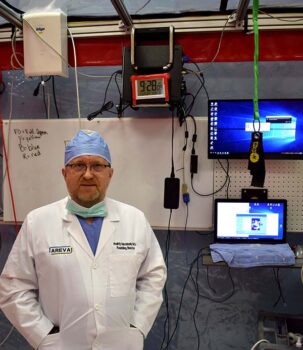 About the Project
About the Project
Extracorporeal Blood Disinfection for Treatment of Persistent Lyme and Co-Infections: an ex-vivo safety, feasibility and efficacy pilot study
Dr. Batchinsky would conduct this research at the Autonomous Reanimation and Evacuation (AREVA) extracorporeal circulation laboratory. This facility is a full cycle research laboratory and innovation center that has world class, preclinical / clinical research capabilities.
The goal of this project is to design and test an extracorporeal circulation device capable of ex vivo and, eventually, in vivo eradication of circulating chronic infections and tick-borne diseases in blood. He will create a dialysis-like device that could be used for extracorporeal blood purification using ozone or other gas.
2022 ELA Winners
We were pleased to announce the recipients of the 2022 Emerging Leader Awards, which were designed to support promising scientists who represent the future of Lyme disease-research leadership.
This year the Emerging Leader Awards were made possible through the generosity of a coalition of three family foundations who believe in the creative nature of bringing researchers from other disciplines into the field of Lyme disease.
$100,000 Grant
 Nichole Pedowitz, PhD
Nichole Pedowitz, PhD
Postdoctoral Fellow, Stanford University
Dr. Nichole Pedowitz is a post-doctoral researcher in the Bogyo Lab at Stanford University School of Medicine. She received a dual B.S. in Chemistry and Biological Sciences from the University of Maryland and a Ph.D. in Chemistry from the University of Southern California.
At Stanford, her current research focuses on using activity-based protein profiling (ABPP) to identify active hydrolytic enzymes expressed by infectious Borrelia burgdorferi. Her ELA project plans to exploit the endogenous activity of this class of enzymes to develop covalent affinity ligands that will ultimately be conjugated to a graphene biosensor. The resulting device will be capable of diagnosing active infection for both early- and late- stage Lyme disease.
About the Project
A peptide conjugated biosensor for direct detection of active Borrelia spirochetes in Lyme disease
Dr. Pedowitz’s project aims to develop a new rapid diagnostic test to target active Borrelia spirochetes directly by using a peptide conjugated biosensor for the direct detection. She plans to demonstrate that peptide conjugated biosensors can detect Borrelia burgdorferi within patient samples. The long-term goal of this project is to develop a device prototype that can be used to diagnose Lyme at the point-of-care.
$100,000 Grant
 Peter Gwynne, PhD
Peter Gwynne, PhD
Post Doctoral Researcher, Tufts University
Dr. Gwynne earned a BSc in Biochemistry from Cardiff University and a PhD in Molecular Microbiology from The University of Edinburgh. In Edinburgh, he completed two postdoctoral positions working between academia and industry, developing an antimicrobial medical device and working to improve pharmaceutical bioprocesses. His research focuses on developing novel technologies for the prevention, diagnosis, and treatment of bacterial infections.
In 2018, he moved to Tufts University School of Medicine to study the metabolic adaptation of the Lyme disease bacterium B. burgdorferi to their human hosts. From this work, a series of antibodies were identified and found to be diagnostic for acute Lyme disease. His current project will use samples from the Lyme Disease Biobank to test whether these antibodies could also be used to diagnose persistent symptoms of the disease.
About the Project
Anti-lipid antibodies for the diagnosis of persistent Lyme disease
Building on his previous work that has identified three antibodies which are markers of acute infection, this project will investigate the contribution of these antibodies in patients with acute and persistent symptoms. He plans to expand the antibody target panel to include other lipid species, and he will study the antibodies as diagnostic biomarkers. The goal is to conduct a complete survey of anti-lipid antibodies in acute and persistent Lyme disease and to begin investigations into the use of some of these antibodies as diagnostic markers of persistent disease. This data could form the basis for a test capable of quantifying the occurrence and resolution of post-treatment Lyme disease symptoms.
2021 ELA Winners
We were pleased to announce the recipients of the 2021 Emerging Leader Awards, which were designed to support promising scientists who represent the future of Lyme disease-research leadership.
This year the Emerging Leader Awards were made possible through the generosity of a coalition of three family foundations who believe in the creative nature of bringing researchers from other disciplines into the field of Lyme disease.
$250,000 ELA Grant
Michael P. Rout, PhD
 Professor and Head of Laboratory, Laboratory of Cellular and Structural Biology, The Rockefeller University
Professor and Head of Laboratory, Laboratory of Cellular and Structural Biology, The Rockefeller University
Dr. Michael Rout is a Professor and Head of Laboratory, Laboratory of Cellular and Structural Biology at the Rockefeller University. Dr. Rout is interested in how proteins assemble to form the dynamic assemblies comprising cells, and in the nature of diseases associated with alterations in those assemblies. He has focused on the nuclear pore complex, and by systematically developing and applying structural and interactomic approaches, he and his colleagues have computed three-dimensional maps of its architecture, sufficient to resolve its molecular organization and provide insights into how it transports macromolecules between the nucleus and cytoplasm.
Dr. Rout has formed the National Center for Dynamic Interactome Research, which includes several collaborating laboratories at Rockefeller and other institutions. This center is developing the methodologies required to obtain a comprehensive map of protein interactions within any organism, and to study their dynamic behaviors. This will allow researchers to explore the utility of the technology for functional elucidation of complex biological processes, with a strong focus on infectious disease.
Dr. Rout earned his Ph.D. in molecular biology from University of Cambridge and has B.A. and M.A degrees in zoology.
He received $250,000 for his work with nanobodies to develop a sensitive point-of-care diagnostic. Dr. Rout and colleagues are investigating nanobodies, a class of small antibody-like molecules derived from llamas and related species, for potential use in rapid point-of-care diagnostics or as therapeutics. For his ELA project, he will be developing nanobodies with high affinity and avidity to Borrelia proteins that can be developed into sensitive Lyme Disease diagnostic tests.
$100,000 ELA Grant
Brandon Jutras, PhD
 Assistant Professor, Department of Biochemistry and Fralin Life Sciences Institute at Virginia Tech
Assistant Professor, Department of Biochemistry and Fralin Life Sciences Institute at Virginia Tech
Dr. Brandon Jutras is an Assistant Professor in the Department of Biochemistry and Fralin Life Sciences Institute at Virginia Tech. He is also part of the Center for Emerging, Zoonotic, and Arthropod-borne Pathogens, the Molecular and Cellular Biology program, in addition to the Translational Biology, Medicine, and Health program at Virginia Tech.
Dr. Jutras has focused his entire research career on studying the biology and pathogenesis of Borrelia burgdorferi. With over 25 peer reviewed publications in many of science’s top journals, Dr. Jutras uses a diverse array of atomic, molecular, and cellular tools to diagnose, understand, and treat Lyme disease. His approach challenges paradigms in bacterial physiology and his research group leverages their findings to improve the overall welfare of humans and animals.
He earned his Ph.D. in Microbiology from the College of Medicine at University of Kentucky.
He received $100,000 toward the development of a novel direct-detection diagnostic approach for Lyme disease. Based on past research in Lyme disease pathogenesis, Dr. Jutras is working to develop a novel diagnostic that can detect peptidoglycan, a component that makes up the cell wall of bacteria, as a biomarker for acute Lyme disease.
$100,000 ELA Grant
Nitya Ramadoss, PhD
 Research Scientist, Stanford University
Research Scientist, Stanford University
Dr. Ramadoss is currently a Research Scientist at Stanford University in the laboratory of Dr. William Robinson. Her research focuses on mapping the transcriptional landscapes and B cell receptor repertoires of Borrelia burgdorferi antigen-specific B cells in individuals that suffer from Post-treatment Lyme Disease Syndrome (PTLDS), in an effort to understand why some people return to health after antibiotic treatment post-Borrelia infection, while others do not.
Dr. Ramadoss earned a MSc in Chemical Biology from University of Leeds and a PhD in Biochemistry, Molecular Biology and Microbiology from the Pennsylvania State University. She then went on to complete her postdoctoral studies at both the California Institute for Biomedical Research (Calibr at Scripps Research), and Stanford University.
Dr. Ramadoss received $100,000 toward the development of a novel therapeutic based on B-cell mapping. Her ELA project is focused on the mechanisms underlying protective and pathogenic immune responses in Lyme disease. The goal of her research is to support the development candidate monoclonal antibody therapeutics to promote clearance of Borrelia burgdorferi infections and prevent development of Persistent Lyme Disease (PLD).
2020 ELA Winners
The research projects of the two 2020 $100,000 Emerging Leader Award recipients both aim to improve the accuracy of Lyme disease tests, and each researcher shares more details about their project on the newly-launched Bay Area Lyme Ticktective™ podcast. Click here to listen to the podcasts and subscribe on your preferred podcast app or click here to watch the video versions.
$100,000 ELA Grant
 Jacob Lemieux, MD, D.Phil.
Jacob Lemieux, MD, D.Phil.
Post-Doctoral Researcher, Harvard University
Dr. Jacob Lemieux is a post-doctoral researcher in the Sabeti Lab at Harvard University and an infectious disease fellow at Massachusetts General Hospital and Brigham and Women’s Hospital. He holds a B.S. from Stanford University, a D.Phil. in molecular parasitology from Oxford University, where he was a Rhodes Scholar and member of the NIH-Oxford Graduate Partnership Program, and an M.D. from Harvard Medical School.
As an active infectious disease clinician, Dr. Lemieux cares for patients with a variety of infectious diseases. The goal of his research is to improve the care of patients with tick-borne disease by advancing our understanding of fundamental disease mechanisms and developing new diagnostic and therapeutic approaches.
His diagnostic project was selected for the 2020 Emerging Leader Award, a $100,000 grant. For a description of his current Lyme research, click here.
$100,000 ELA Grant
 Artem Rogovskyy, DVM, PhD, DACVM
Artem Rogovskyy, DVM, PhD, DACVM
Assistant Professor, Texas A&M University
Dr. Artem Rogovskyy is currently an Assistant Professor of Veterinary Pathobiology at the College of Veterinary Medicine and Biomedical Sciences at Texas A&M University. He received his Ph.D. in Veterinary Science from Washington State University, his M.S. in Food Science at Louisiana State University, and his D.V.M. in Veterinary Medicine from National University of Life and Environmental Sciences of Ukraine.
At Texas A&M, his current research laboratory has a long-term goal to develop effective measures aimed at reducing incidence of Lyme disease in the United States and worldwide. To achieve this goal, Dr. Rogovskyy’s lab has prioritized three areas of Lyme disease research. The first is to develop a robust, rapid diagnostic test that would surpass any of the existing Lyme disease diagnostic assays in its sensitivity and specificity. This is the focus of his 2020 Emerging Leader Award. The second line of research is to construct a subunit vaccine for humans that would be not only efficacious at preventing different genospecies of B. burgdorferi but also exert a therapeutic effect during the human infection. The third is to understand how microbial symbionts affect the tick fitness and competency of Ixodes ticks, the vector of B. burgdorferi, with the ultimate aim of developing novel methods that would disrupt the life cycle of Lyme pathogen in nature.
His diagnostic project was selected for the 2020 Emerging Leader Award, a $100,000 grant. For a description of his current Lyme research, click here.
2019 ELA Winners
In 2019, thanks to the generous contributions from Laure Woods and Marc Benioff, Bay Area Lyme Foundation presented two ELA awards totaling $200,000 in project grants to bring innovative projects to proof-of-concept.
$100,000 ELA Grant
Andrea Granados, PhD
Postdoctoral Fellow, Department of Laboratory Medicine, University of California, San Francisco School of Medicine
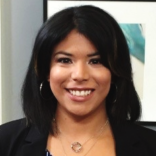 Andrea Granados, PhD is a Postdoctoral Fellow, Department of Laboratory Medicine, University of California, San Francisco School of Medicine. She has a background in epidemiology, molecular biology, virology, and diagnostics. Dr. Granados earned her BSc and MSc degrees from McMaster University and her PhD in Laboratory Medicine from University of Toronto, Canada. Her project was selected for the 2019 Emerging Leader Award, a $100,000 grant. Click here for project details.
Andrea Granados, PhD is a Postdoctoral Fellow, Department of Laboratory Medicine, University of California, San Francisco School of Medicine. She has a background in epidemiology, molecular biology, virology, and diagnostics. Dr. Granados earned her BSc and MSc degrees from McMaster University and her PhD in Laboratory Medicine from University of Toronto, Canada. Her project was selected for the 2019 Emerging Leader Award, a $100,000 grant. Click here for project details.
$100,000 ELA Grant
Geetha Parthasarathy, PhD
Research Scientist, Tulane University
 Dr. Geetha Parthasarathy is a Research Scientist at Tulane University. Her current research focus is Lyme Neuroborreliosis where she seeks to understand the pathogenesis behind glial and neuronal cell death as caused by B. burgdorferi. She earned her BS and MSc degrees from Birla Institute of Technology and Science in Pilani, India, her PhD in Microbiology from Michigan State University and completed Postdoctoral fellowship work at Johns Hopkins University. Her project was selected for the 2019 Emerging Leader Award, a $100,000 grant. Click here for project details.
Dr. Geetha Parthasarathy is a Research Scientist at Tulane University. Her current research focus is Lyme Neuroborreliosis where she seeks to understand the pathogenesis behind glial and neuronal cell death as caused by B. burgdorferi. She earned her BS and MSc degrees from Birla Institute of Technology and Science in Pilani, India, her PhD in Microbiology from Michigan State University and completed Postdoctoral fellowship work at Johns Hopkins University. Her project was selected for the 2019 Emerging Leader Award, a $100,000 grant. Click here for project details.
2018 ELA Winners
In 2018, thanks to the generous contributions from The Steven & Alexandra Cohen Foundation, Bay Area Lyme Foundation presented four ELA awards totaling $450,000 in project grants to bring innovative projects to proof-of-concept.
$250,000 ELA Grant
Ting Wu, PhD: 2018 Emerging Leader Award Recipient ($250,000 grant)
Professor of Genetics at Harvard Medical School; Director of the Consortium for Space Genetics; Director of the Personal Genetics Education Project
 Dr. Ting Wu’s laboratory is dedicated to expanding our understanding of genome structure and function, focusing most heavily on the extraordinary relationship of the three-dimensional organization of the genome to genome inheritance and activity. Dr. Wu is the recipient of an NIH Director’s 2012 Pioneer Award as well as an NIH Director’s 2016 Transformative Research Award. Her project was selected for the 2018 Emerging Leader Award, a $250,000 grant. Click here for project details.
Dr. Ting Wu’s laboratory is dedicated to expanding our understanding of genome structure and function, focusing most heavily on the extraordinary relationship of the three-dimensional organization of the genome to genome inheritance and activity. Dr. Wu is the recipient of an NIH Director’s 2012 Pioneer Award as well as an NIH Director’s 2016 Transformative Research Award. Her project was selected for the 2018 Emerging Leader Award, a $250,000 grant. Click here for project details.
$100,000 ELA Grant
Steven Phillips, MD: 2018 Emerging Leader Award Recipient ($100,000 grant)
Principal Investigator for Kyronyx Biosciences
 A world-renowned expert on zoonotic infections, Dr. Phillips has treated over 20,000 patients from over 20 countries. He is well-published in the peer-reviewed medical literature, acclaimed for his work in linking chronic diseases, and specializes in the management of stealth pathogens, which include Lyme disease, bartonellosis, babesiosis, and other vector-borne diseases. He is currently involved in drug development to bring public a durable and effective treatment for this infection and change the face of rheumatology forever. His project, detailed below, was selected for the 2018 Emerging Leader Award, a $100,000 grant. Click here for project details.
A world-renowned expert on zoonotic infections, Dr. Phillips has treated over 20,000 patients from over 20 countries. He is well-published in the peer-reviewed medical literature, acclaimed for his work in linking chronic diseases, and specializes in the management of stealth pathogens, which include Lyme disease, bartonellosis, babesiosis, and other vector-borne diseases. He is currently involved in drug development to bring public a durable and effective treatment for this infection and change the face of rheumatology forever. His project, detailed below, was selected for the 2018 Emerging Leader Award, a $100,000 grant. Click here for project details.
$100,000 ELA Grant
Michal Caspi Tal, PhD: 2018 Emerging Leader Award Recipient ($100,000 grant)
Postdoctoral Research Fellow, Stem Cell Biology and Regenerative Medicine, Stanford University
 Dr. Michal Tal, Postdoctoral Research Fellow, Stem Cell Biology and Regenerative Medicine, leads the infectious disease team within Irving Weissman’s lab at Stanford University. She is studying the immunomodulatory mechanisms by which the CD47-SIRPa axis impacts immune clearance of infectious disease. She is interested in the mechanisms of immune regulation that rein in the immune response and can be targeted to enable clearance of chronic infection. Her project, detailed below, was selected for the 2018 Emerging Leader Award, a $100,000 grant. Click here for project details.
Dr. Michal Tal, Postdoctoral Research Fellow, Stem Cell Biology and Regenerative Medicine, leads the infectious disease team within Irving Weissman’s lab at Stanford University. She is studying the immunomodulatory mechanisms by which the CD47-SIRPa axis impacts immune clearance of infectious disease. She is interested in the mechanisms of immune regulation that rein in the immune response and can be targeted to enable clearance of chronic infection. Her project, detailed below, was selected for the 2018 Emerging Leader Award, a $100,000 grant. Click here for project details.
2017 ELA Winners
Bay Area Lyme Foundation was pleased to announce the winners of the 2017 Emerging Leader Awards. Thanks to the generous contributions from The Steven & Alexandra Cohen Foundation, we presented two ELA awards totaling $350,000 in project grants to bring innovative projects to proof-of-concept.
$250,000 ELA Grant
James J. Collins, PhD
Core Faculty, Wyss Institute, Harvard University; Termeer Professor of Medical Engineering & Science; Professor of Biological Engineering, MIT
 Dr. Collins and his lab work in synthetic biology and systems biology, with a particular focus on using network biology approaches to study antibiotic action, bacterial defense mechanisms, and the emergence of resistance. Professor Collins’s patented technologies have been licensed by over 25 biotech, pharma and medical devices companies, and he has received numerous awards and honors, including a Rhodes Scholarship and a MacArthur “Genius” Award. Professor Collins is an elected member of the National Academy of Sciences, the National Academy of Engineering, the Institute of Medicine, and the American Academy of Arts & Sciences, and a charter fellow of the National Academy of Inventors. He received his AB in Physics at Holy Cross, where he was valedictorian, and his PhD in Medical Engineering at Oxford.
Dr. Collins and his lab work in synthetic biology and systems biology, with a particular focus on using network biology approaches to study antibiotic action, bacterial defense mechanisms, and the emergence of resistance. Professor Collins’s patented technologies have been licensed by over 25 biotech, pharma and medical devices companies, and he has received numerous awards and honors, including a Rhodes Scholarship and a MacArthur “Genius” Award. Professor Collins is an elected member of the National Academy of Sciences, the National Academy of Engineering, the Institute of Medicine, and the American Academy of Arts & Sciences, and a charter fellow of the National Academy of Inventors. He received his AB in Physics at Holy Cross, where he was valedictorian, and his PhD in Medical Engineering at Oxford.
Project Overview
Dr. Collins’s ELA project focuses on highly sensitive, paper-based, direct detection RNA-based diagnostics for Borrelia burgdorferi and early Lyme disease. The amount of borrelial RNA in a blood sample of a patient with Lyme is likely to be present in much larger quantities than the DNA, making direct detection of the pathogen easier. His lab recently developed a platform for direct detection of RNA that combines programmable molecular sensors called RNA toehold switches with an expression system that can be freeze dried onto paper discs. Toehold switch sensors are synthetic regulators that control the translation of a gene, and these can be designed to bind and sense any RNA sequence.
$100,000 ELA Grant

Yuko Nakajima, PhD
Postdoctoral Fellow, Brandeis University
Dr. Nakajima is currently a Postdoctoral Fellow in the lab of James E. Haber at Brandeis. Prior to beginning her Borrelia burgdorferi research, her work investigated the relationship between DNA damage and spindle assembly checkpoints during cell division. She also performed postdoctoral research at Rockefeller University and served as a research assistant at Lawrence Berkeley National Laboratory. Dr. Nakajima received her BS in Biological Sciences from Purdue University and her PhD at the University of California, Berkeley.
Project Overview
Dr. Nakajima’s ELA project focuses on outsmarting smart bugs by blocking immune evasion by Borrelia burgdoferi and other pathogens through gene conversion. Just like in cancer, gene conversion was recently shown to be instrumental in Borrelia burgdoferi’s ability to change its surface proteins and thus keep the immune system from manufacturing antibodies that match the currently expressed proteins. This ability to change its proteins is mediated by an unusual DNA structure called a G-quadruplex. A drug blocking G-quadruplex activity in cancer cells is currently in clinical trials. Dr. Nakajima will study the G-quadruplex in Borrelia burgdorferi and then test different small molecules to detect which may be most able to block this coping mechanism.
2016 ELA Recipients
Bay Area Lyme Foundation presents the winners of the 2016 Emerging Leader Awards. Thanks to the generous contributions from The Steven & Alexandra Cohen Foundation and The Laurel Foundation, we presented two ELA awards with each recipient receiving a $100,000 project grant to bring an innovative project to proof-of-concept.
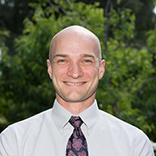
Alexandra Cohen Emerging Leader Award
Britton J. Grasperge, PhD
Assistant Professor—Clinical Pathology, Louisiana State University
 Laure Woods Emerging Leader Award
Laure Woods Emerging Leader Award
Chase L. Beisel, PhD
Scientist, Helmholtz Institute for RNA-based Infection Research
2015 ELA Recipients
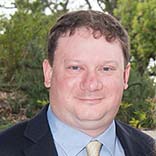 John A. Branda, MD
John A. Branda, MD
Assistant Professor, Harvard Medical School and Assistant Pathologist, Massachusetts General Hospital (MGH) and Associate Director of the Clinical Microbiology Laboratories at MGH and Director of the Clinical Laboratory at Nantucket Cottage Hospital

Nira Pollock, MD, PhD
Assistant Professor at Harvard Medical School, and Associate Medical Director of the Infectious Diseases Diagnostic Laboratory at Boston Children’s Hospital
2014 ELA Recipients
 Jerome F. Bouquet, PhD
Jerome F. Bouquet, PhD
A postdoctoral fellow at University of California, San Francisco for his project: Development of a Host Biomarker Assay for the Diagnosis of Acute Lyme Disease and Post-Treatment Lyme Disease Syndrome
 Lisa K. Blum, PhD
Lisa K. Blum, PhD
A postdoctoral fellow at Stanford University for her project: Sequencing of Antibody Responses to Borrelia burgdorferi Infection—Generation of Recombinant Antibodies with Diagnostic and Therapeutic Utility